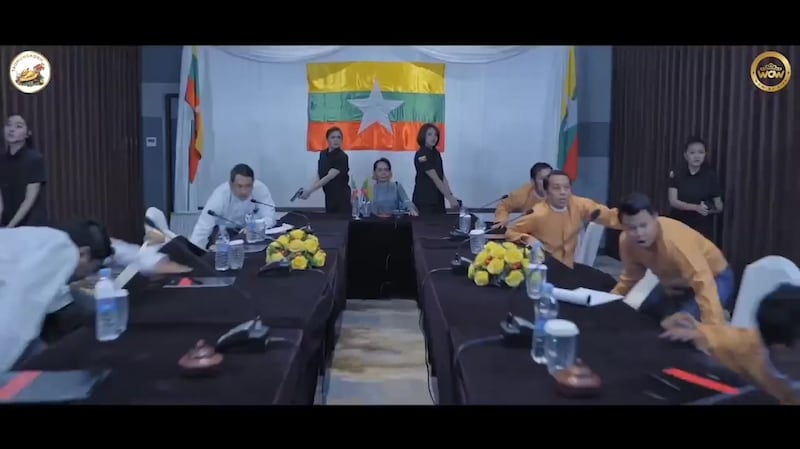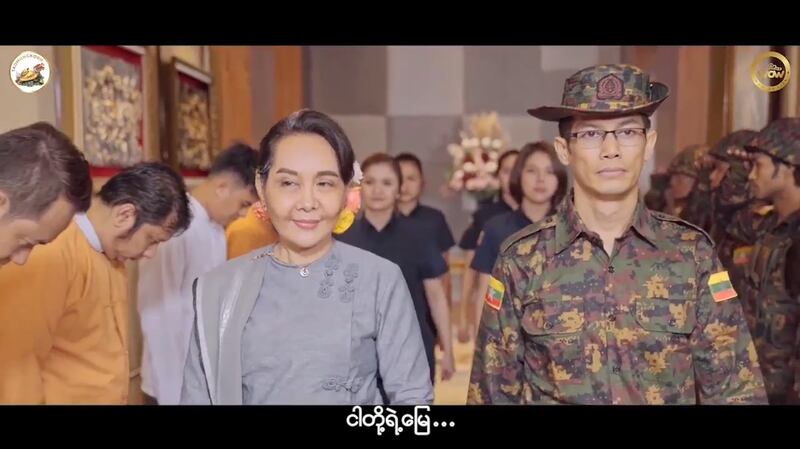A pair of singers in the Southeast Asian countries of Vietnam and Myanmar found themselves in hot water after airing unpopular political views, sources in the two countries told RFA.
In Myanmar, pop singer-actor Yone Lay triggered controversy over a music video that depicted a fictitious assassination attempt on State Counselor Aung San Suu Kyi.
A scene in the video for the song “Our Land” shows a group of masked gunmen storming into a government meeting in an attempt on the 75-year-old Nobel laureate’s life. Members of the military then come to the rescue, thwarting the assassination attempt and emerging victorious in the ensuing firefight.
Military Commander-in-Chief Min Aung Hlaing then enters the room and he and Aung San Suu Kyi shake hands, with the state counselor appearing thankful for the army’s protection.

Actor Chan Chan, who appeared in the video, told local media that she would not have acted in it if she had known the plot. She said the plot was a bad omen on the eve of national elections, scheduled for November 8.
Members of the National League for Democracy (NLD) told RFA that they found the video upsetting.
“I think it pushes the NLD to the edge, and I was so angry watching the part that showed an attempt on the life of Mother Suu,” said Helen Aye Kyaw, a NLD member from Mandalay.
On his Facebook page, Yone Lay said he did not receive any money or support from any organization to produce the video, suggesting that it represented only his views.
Htay Aung, an independent candidate for Myanmar’s lower house from the Yangon region, told RFA he supported the actor.
“It is a valuable message, as he conveyed the need for unity among all political parties in the country for the benefit of the nation. I really don’t understand why this was misinterpreted,” said Htay Aung.
“I feel like [the backlash] is crushing the creativity of an emerging young artist. [Yone Lay] also said the video was neither for the red nor the green,” Htay Aung said, referring to the colors of the NLD and the main opposition group, the army-backed Union Solidarity and Development Party.
“It was misunderstood and has been badly described. I support the singer Yone Lay,” the candidate said.

But a former political prisoner says the video has a hidden agenda.
“I definitely condemn it. This is intentional, disregarding public view and adding irrelevant issues in the video,” Nyan Aye told RFA.
“The public is not as [naive] as it was in the past as globalization has grown and the people know what it means. It’s merely an excuse to say he had no intentions,” Nyan Aye said, adding, “I don’t totally believe that he has no intentions since he has enough creativity.”
Chit Kaung told RFA that artists should be unbiased.
“We have to be colorless. My understanding and belief is that we have to maintain colorlessness because artists will still be here even when political parties and governments come and go,” the pop singer told RFA.
“You can’t do as you wish just because you’re an artist,” Chit Kaung said.
Following the criticism and backlash, Yone Lay issued a statement of apology on social media.
“I expected that all our leaders, including Mother Suu, would like the video. I think and I hope that if she were to watch the video herself, she would not be angry at me,” he wrote.
“If I was wrong, I apologize to the Mother. I will take down the video. And I promise never to be involved in politics, ever.”
The video was officially taken offline following the controversy, but has been uploaded to several YouTube accounts.

Vietnamese Singer Fined over South China Sea views
In Vietnam, singer Duy Manh published a status update to his Facebook account that seemed to trivialize the impact of Chinese claims to the disputed Spratly and Paracel islands in the South China Sea.
“[Expletive] If China occupies the islands, they will only take over two island [chains] without people. They won’t occupy our country and become responsible for 90 million people [expletive],” he wrote.
“If suddenly Cambodia begged to become part of Vietnam, would Vietnam even dare to agree?” he added, implying that such a merger would be a hardship on Vietnam as it would have to care for many impoverished Cambodians.
Duy Manh’s views came to light when a Facebook user named Ngoc Vu shared the status, saying in her opinion the “obscene comments were wrong about Vietnam’s sovereignty.” As other users shared and commented on the status it went viral.
He was sanctioned for inappropriate speech Aug. 7 and fined 7.5 million dong (U.S. $320) for customs and practices related to cursing and profanity on the internet by the Ho Chi Minh City department of information and communications.
The singer initially supplied documents saying that his comments had been edited, but later admitted to committing the violations.
The day before he was fined, authorities told local media that he could be suspended from singing if he did not correct his remarks.
Le Quang Tu Do of Vietnam’s Ministry of Information and Communications said on Aug. 6 said the ministry at that time was investigating if the “incorrect speech” was from Duy Manh’s account, adding that if it was, the ministry would take measures to prevent his performance.
The comments were deleted on Aug 7.
Education to blame
Journalist Nguyen Ngoc Gia told RFA that Duy Manh’s comments were a product of a failed education system.
“Duy Manh’s statement proves that non-philosophical education has been successful. He is the embodiment of a product which can only be due to the socialist-oriented market economy,” Nguyen told RFA’s Vietnamese Service.
Songwriter Tuan Khanh told RFA that the punishment was merely an example of the government appearing to be concerned.
“Social media in some respects serves as the people’s conscience in Vietnam. People are on Facebook every day to raise issues about Vietnam’s situation,” said Tuan Aug. 7.
“When these issues become major topics of discussion, the authorities think they need to clarify their positions to prove they have responsibility, so they jump in to ‘solve’ the problem,” Tuan said.
Though the Vietnamese government claims the contested archipelagoes, it also goes out of its way to avoid angering China, routinely silencing Vietnamese activists who protest over increasing Chinese control of disputed South China Sea territories.
But citizens can also get in trouble for failing to acknowledge the islands as Vietnamese.
RFA reported last month that authorities would begin to fine drivers using older license plates, because they contained a map of the country that omitted the contested islands, after issuing a newer design of the plates that included the islands.
RFA attempted to contact Duy Manh at the phone number listed on his webpage, but it appears to belong to someone else.
Reproted by RFA’s Vietnamese Service and Khin Maung Soe for RFA’s Myanmar Service. Translated by Nandar Chann and Huy Le. Written in English by Eugene Whong.
